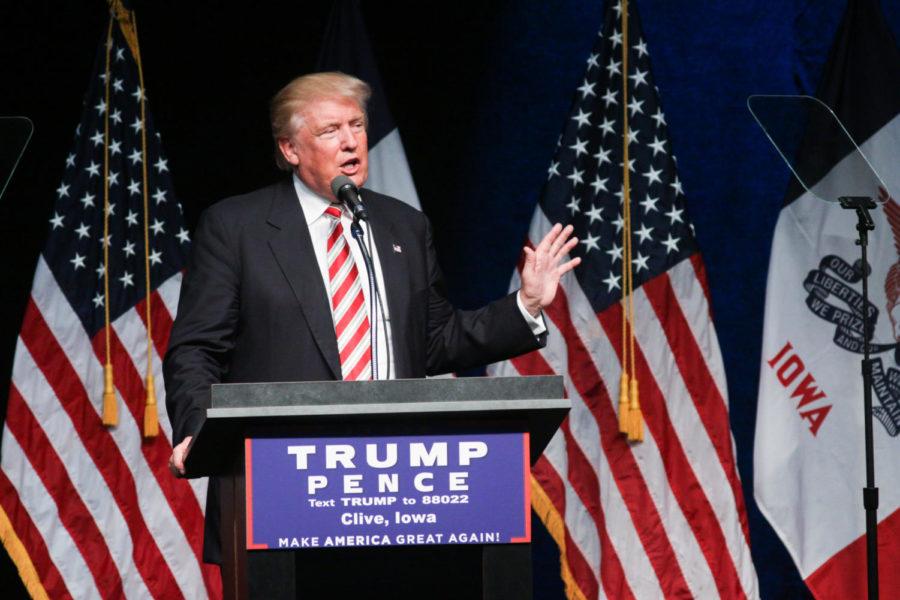Kelly: Keep politics out of sports
Donald Trump, republican presidential nominee, addresses a crowd of supporters during a rally Sept. 13 in Clive, Iowa. “It is so great to be back in Iowa,” said Trump.
January 30, 2018
Last week, columnist Frank Bruni wrote a piece in the New York Times titled, “The Existential Hell of This Year’s Super Bowl,” with the subhead, “It’s the Patriots—again—and a metaphor for Trump’s America.”
In the column, Bruni not only remarks that he is bored by and tired of the New England Patriots’ success, but also argues the Patriots—as well as their Super Bowl opponent—illustrate, as he sees it, the inequity and vice rampant in “Trump’s America.”
Bruni writes, “The Patriots perfectly embody our income-inequality era and the tax reform that President Trump recently signed. Their good fortune begets more good fortune.”
Presumably, Bruni does not mean the Patriots staff members and players are being paid more on average than their National Football League counterparts—they aren’t—or the Patriots staff members and players are giving their employees bonuses or increasing their employees’ hourly wage.
How, then, do the Patriots “perfectly embody our income-inequality era,” or tax reform? Ticket and merchandise sales are the result of consensual monetary transactions between fans and the Patriots organization. Television contracts and advertising revenue are, in part, the result of being popular, and popularity, at least in regards to sports, is mostly tied to a team’s on-field success, or lack thereof.
Also, while it is true that, in many endeavors, past or present success often leads to success in the future, Bruni fails to show a correlation between businesses lauding recent tax reform, and the continued success of the Patriots. He is simply reading politics into a situation which is entirely apolitical.
However, Bruni’s ire is not solely directed toward the Patriots. “These Eagles aren’t cuddly underdogs,” he writes. “They have fans so famously obnoxious that after Sunday’s rout, some of them threw beer cans at a Vikings team bus as it pulled away from the stadium. Sore winning: I wonder which of our amazing leaders taught them that.”
The suggestion that Philadelphia Eagles fans behaved inappropriately after the Eagles won the NFC Championship because they were mimicking Donald Trump is preposterous, if for no reason other than the fact that Trump won the state of Pennsylvania by only seven-tenths of a percentage point, and Hillary Clinton won 82 percent of the vote in Philadelphia County.
Sports evoke strong emotions in fans; disreputable behavior and inter-team hostility existed long before Jan. 20, 2017.
Finally, Bruni states the defeats of two teams from lesser-known sports cities is proof of, as he sees it, the Trump administration’s bias towards so-called East Coast “elites.”
“Football, like Trumpism, likes to believe that it’s about working-class folks in the heartland. But this year’s Super Bowl, like the Trump administration, bows to the Acela corridor. It nearly brought together two teams from underexposed cities, Jacksonville and Minneapolis… So much for the little guy.”
Once again, Bruni sees correlation where none exists. The games were not rigged in favor of the “elites.” The Jaguars and Vikings were not cheated. Nor could it necessarily be said, for example, Eagles players are all arrogant “elites” who, simply because Philadelphia is a historically prominent and athletically-storied city, do not typify the demographics or qualities of the citizens of Philadelphia.
Tiring of the Patriots’ success is understandable. But viewing something as nonpartisan as a sporting event through the lens of politics is a slippery slope. We already live in a politically polarized society. If sports continue to be unnecessarily politicized, pre-existing divisions will only be exacerbated, further fraying the social fabric.







